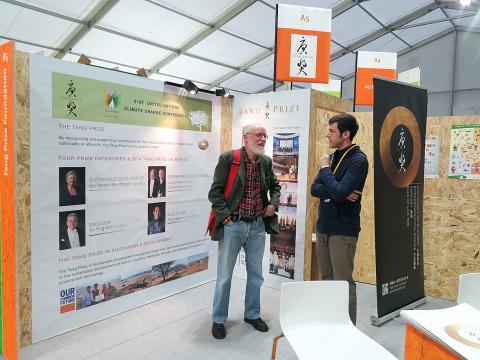Taiwan’s government representatives may not have been allowed to participate in the negotiation process at the Paris Climate Change Conference, but civic society organizations made their presence felt.
A number of committed climate activists from Taiwan, along with environmental groups and researchers, represented the nation at the 21st UN Climate Change Conference of Parties (COP 21), which took place from Nov. 30 to Dec. 11.
Because Taiwan is not a member of the UN, activists had to use other means to garner international support in order to gain entrance.

Photo: Jason Pan, Taipei Times
“We represent young people in Taiwan who are concerned about global warming and its effects,” said William Cheng (程泫尹) who spoke on behalf of an environmental organization from Canada.
Cheng’s organization is classified as part of the “Youngo” (Young People’s Organizations) — non-state entities given observer status.
Other non-state entity groupings include “Engo” (Environmental Organizations), “Tungo” (Trade Union Organizations) and“IPO” (Indigenous Peoples Organizations), among others.
Lindsey Wu, an environmental activist from Taiwan, who fell under the “Engo” category, has participated in climate change meetings in the past.
“It has been very difficult for someone from Taiwan to attend these UN climate forums because the Taiwanese government is excluded from the process, and this also precludes effective participation by us NGOs,” she said.
Wu added that at times, it was frustrating to see many small Third World nations entering COP 21 venues and engaging in climate negotiation.
“It’s like the world has invited everyone to a big party, but when mentioning that we are from Taiwan, the door is slammed shut to keep us out in the cold.”
Wu believes Taiwan should forge stronger bonds with its Pacific allies such as Kiribati, the Marshall Islands and the Solomon Islands — all who were well-represented at the COP meetings.
Ghazali Ohorella, an executive of Pacific Island Youth Network, said: “Taiwan is part of the global community, and they are suffering from the effects of global warming, just like other nations; Taiwan and its NGO representatives should be allowed to participate as an equal member in the COP 21 process.”
Instead, Taiwan’s government was only allowed to send a delegation of 50 people headed by the Environmental Protection Agency (EPA) to Paris. However, they tried to make the most out of the circumstances. On Dec. 10, a press conference was held at the Representative Office of Taiwan to discuss future goals such as gaining observer status at upcoming COP 21 events.
In addition, the government delegation has co-sponsored programs and seminar talks at venues of the official COP 21 site.
While smaller NGOs fought tooth and nail to participate at COP 21, larger organizations, by contrast, filled up most of the booths at COP 21’s NGO halls; they included the Tzu Chi Foundation, the Tang Prize Foundation and Delta Electronics Inc.

April 14 to April 20 In March 1947, Sising Katadrepan urged the government to drop the “high mountain people” (高山族) designation for Indigenous Taiwanese and refer to them as “Taiwan people” (台灣族). He considered the term derogatory, arguing that it made them sound like animals. The Taiwan Provincial Government agreed to stop using the term, stating that Indigenous Taiwanese suffered all sorts of discrimination and oppression under the Japanese and were forced to live in the mountains as outsiders to society. Now, under the new regime, they would be seen as equals, thus they should be henceforth

Last week, the the National Immigration Agency (NIA) told the legislature that more than 10,000 naturalized Taiwanese citizens from the People’s Republic of China (PRC) risked having their citizenship revoked if they failed to provide proof that they had renounced their Chinese household registration within the next three months. Renunciation is required under the Act Governing Relations Between the People of the Taiwan Area and the Mainland Area (臺灣地區與大陸地區人民關係條例), as amended in 2004, though it was only a legal requirement after 2000. Prior to that, it had been only an administrative requirement since the Nationality Act (國籍法) was established in

With over 80 works on display, this is Louise Bourgeois’ first solo show in Taiwan. Visitors are invited to traverse her world of love and hate, vengeance and acceptance, trauma and reconciliation. Dominating the entrance, the nine-foot-tall Crouching Spider (2003) greets visitors. The creature looms behind the glass facade, symbolic protector and gatekeeper to the intimate journey ahead. Bourgeois, best known for her giant spider sculptures, is one of the most influential artist of the twentieth century. Blending vulnerability and defiance through themes of sexuality, trauma and identity, her work reshaped the landscape of contemporary art with fearless honesty. “People are influenced by

Three big changes have transformed the landscape of Taiwan’s local patronage factions: Increasing Democratic Progressive Party (DPP) involvement, rising new factions and the Chinese Nationalist Party’s (KMT) significantly weakened control. GREEN FACTIONS It is said that “south of the Zhuoshui River (濁水溪), there is no blue-green divide,” meaning that from Yunlin County south there is no difference between KMT and DPP politicians. This is not always true, but there is more than a grain of truth to it. Traditionally, DPP factions are viewed as national entities, with their primary function to secure plum positions in the party and government. This is not unusual